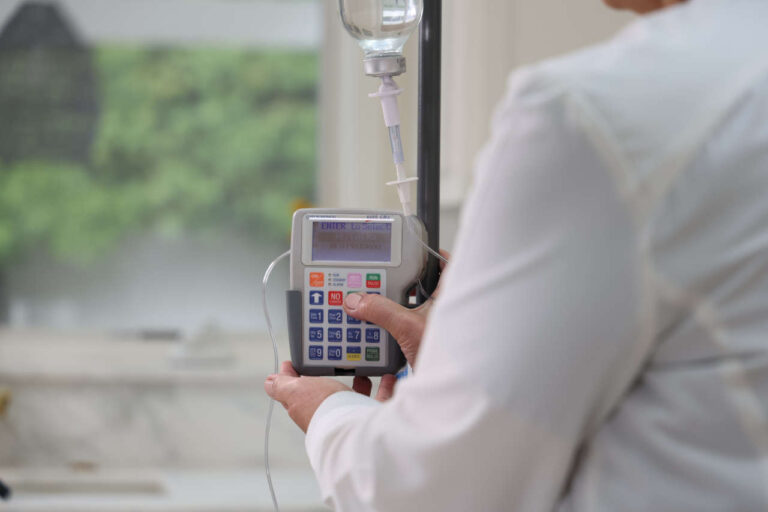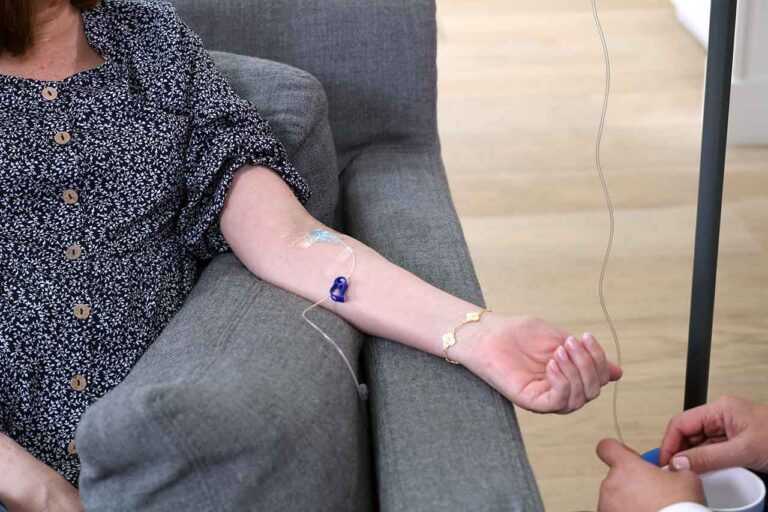
Lupus is a chronic autoimmune condition affecting millions of people worldwide. Without proper treatment, it can lead to debilitating complications and make life difficult. IVIG is one of the most promising treatments for lupus that has emerged in recent years.
Get IVIG Copay Assistance
Speak to a SpecialistAdministering IVIG for lupus can help patients manage their symptoms and improve their quality of life. Join us as we take an in-depth look at IVIG treatment for lupus and unravel the science behind this innovative therapy.
Understanding Lupus
Before we delve into treatments for lupus, we must take a closer look at the disease itself.
Systemic lupus erythematosus (SLE) is an autoimmune disorder in which the immune system attacks the body’s healthy tissues and organs. Certain medications, infections, and environmental factors can trigger it.
Once it appears, it can cause inflammation throughout the body, leading to several complications.
Symptoms of Lupus
IVIG dosage for lupus is determined based on each patient’s symptoms. These symptoms can vary from one person to another.
They come and go in episodes known as flare-ups and can differ based on the tissue the disease targets. Lupus can affect many systems, including the skin, blood, joints, kidneys, etc.
Common symptoms associated with this disease include:
- Fever
- Fatigue
- Dry eyes
- Hair loss
- Joint pain
- Confusion
- Chest pain
- Blood clots
- Headaches
- Muscle pain
- Skin lesions
- Memory loss
- Shortness of breath
- Discolored fingers and toes
- Butterfly-shaped rash across the face
IVIG treatment for lupus can alleviate these symptoms and make life easier.
Causes of Lupus
The exact causes of this autoimmune disease are still unknown. However, studies examining the effects of IVIG on lupus suggest that certain factors can trigger this disorder.
These factors include:
- Infections
- Genetic predispositions and mutations
- Reactions to specific hormones in the body
- Environmental factors like pollution and sun exposure
- Medications like blood pressure and anti-seizure drugs
- Medical history and having other autoimmune diseases
Diagnosing Lupus
Diagnosing lupus can be tricky. Since there isn’t a specific test for this autoimmune condition, doctors usually confirm it by ruling out other diseases.
They will first ask about your symptoms and review your medical history. Afterward, they might use the following tests for confirmation:
- Urinalysis
- Blood tests
- Skin or kidney biopsy
- Antinuclear antibody tests
If the condition is confirmed, the doctor will prescribe IVIG for lupus or recommend other forms of treatment.
Treating Lupus
There is no cure yet for lupus, but different treatments are available that can help reduce the severity of its symptoms.
Some of the most common treatments for lupus include:
- Nonsteroidal anti-inflammatory drugs (NSAIDs) – Used to help reduce inflammation and pain in mild cases of lupus.
- Corticosteroids – Used to alleviate inflammation and manage severe symptoms of lupus.
- Antimalarial drugs – Used to treat skin rashes, joint pain, and lupus-related fatigue.
- Immunosuppressant drugs – Used to control overactive immune systems and minimize inflammation in more severe forms of lupus.
- IVIG – Used to modulate the immune system and reduce the severity of the disease.
Get Your IVIG Dose
At-Home InfusionIVIG Treatment for Lupus

Intravenous immunoglobulin, known as IVIG, is a therapeutic off-label option for lupus. It involves administering a concentrated solution of antibodies derived from human plasma directly into the bloodstream of patients with lupus.
IVIG treatment aims to modulate the immune system by providing a high concentration of normal antibodies to counteract the abnormal autoimmune response seen in lupus.
It helps to reduce disease activity, decrease flare-ups, and alleviate associated symptoms like rashes, fatigue, and joint pain.
IVIG’s Mechanism of Action
The immunoglobulins in the IVIG solution can modulate the immune system in several ways. The infused antibodies can neutralize antibodies that target tissues and reduce the immune response.
They can also inhibit the production of autoantibodies by B lymphocytes and regulate the function of various immune cells, including T lymphocytes.
IVIG for lupus can also suppress inflammation by lowering the production of pro-inflammatory cytokines and enhancing the function of anti-inflammatory cytokines.
These are some ways IVIG can restore immune balance and mitigate tissue damage in lupus. However, there is more to IVIG and immune diseases. We need more scientific data to understand the exact mechanisms.
Is IVIG Treatment Effective for Lupus?
While IVIG may not be considered first-line therapy for lupus, it’s an effective treatment that can help patients experience less severe symptoms.
Several studies point to the effectiveness of IVIG for lupus. Let’s take a closer look at some of them.
IVIG Therapy in a Patient With Severe Symptoms
An early study in 2000 evaluated the effectiveness of IVIG therapy in a lupus patient with severe symptoms, including pericarditis, pleural effusion, nephrotic range proteinuria, and more.
The patient received a course of high-dose IVIG treatment. One week after receiving the treatment, she showed significant improvements. After a month, her proteinuria decreased, and her pericarditis resolved.
This study highlights the potential benefits of IVIG for those with severe clinical manifestations.
IVIG as Monotherapy in Patients with Cutaneous Lupus Erythematosus
Another study in 2015 examined the usefulness of IVIG for cutaneous lupus erythematosus (CLE).
In this study, researchers screened 16 patients who didn’t see any improvements with other treatments for CLE. They administered IVIG to these patients for three months and monitored them for six more months.
They saw significant improvements in their symptoms with lower disease activity. Three patients did experience temporary flare-ups but recovered shortly thereafter. No adverse reactions occurred during treatment.
Results suggest that IVIG can be an ideal treatment for lupus in those who haven’t responded well to other therapies.
IVIG Treatment for Cardiomyopathy in Patients With SLE
A more recent study in 2021 evaluated the efficacy of IVIG for lupus-related cardiomyopathy.
In this study, five female patients with systemic lupus erythematosus and acute heart failure received high-dose IVIG.
After a month of receiving infusions, patients saw a dramatic improvement in their cardiac function that continued after the treatment ended.
The results of this study show that IVIG can be a safe and well-tolerated treatment option for those with lupus acute cardiomyopathy.
A Systematic Review of Literature
Finally, in 2022, scientists performed a systematic review of 2328 articles to determine the safety and efficacy of IVIG for lupus nephritis (LN).
They found that IVIG therapy had a 60%-70% efficacy for patients who didn’t respond well to first-line treatments.
These studies point to the potential of IVIG infusion treatment. If you’re suffering from this condition and have been considering IVIG therapy, now is the time to discuss it with your doctor.
Can IVIG help?
Free IVIG Treatment InfoHow to Receive IVIG Treatment for Lupus?
You can receive IVIG infusions if you’re an eligible candidate for the treatment. These are the steps involved for treatment.
1. Consult With a Physician
The first step for receiving IVIG for lupus is consulting with a physician specializing in lupus. Discuss your symptoms, medical history, previous treatments, and concerns with the doctor.
Be open so the doctor can diagnose the disease accurately and determine the best treatment.
2. Diagnosis and Pre-Treatment Evaluation
Before starting treatment, the doctor will order various diagnostic tests to confirm you have lupus and determine the severity of the disease.
The doctor will also perform a comprehensive pre-treatment evaluation to assess your overall health and determine your eligibility for IVIG for lupus.
3. Insurance Coverage and Financial Aid
IVIG treatment for lupus can become costly. Each gram of an IVIG solution can start at $100 and go up to $350.
The price can vary based on each patient’s condition and IVIG brand. The high cost can be a financial burden.
Before starting treatment, check with your insurance provider to determine if they cover the therapy. If not, there are other financial aid programs that can help lower your treatment costs.
4. Treatment Planning
Once you’re deemed eligible to receive IVIG therapy for lupus and the medication is covered by your insurance, the doctor will create a personalized treatment plan.
This detailed plan will outline factors like IVIG dosage, frequency of infusions, and treatment duration. The doctor will also discuss the benefits and potential risks of IVIG.
5. IVIG Administration
Once the doctor determines the frequency of your treatments, you can visit an outpatient center to receive the infusions. You can also get home infusions from trained nurses who will come to you.
The nurse will administer the solution via an IV drip intravenously or subcutaneously. Each IVIG infusion for lupus can run for about 3 to 5 hours.
IVIG treatment for lupus is not a painful procedure. However, you may experience temporary side effects after each infusion, such as flu-like symptoms, headaches, and nausea.
6. Monitoring and Follow-up
Your doctor will schedule follow-up appointments to check your body’s response to the treatments. They might adjust the dosage or frequency of infusions based on your response to get the best results with IVIG
It might take you a few days to weeks to notice any changes in your symptoms. You will start to see noticeable improvements after a few months.
Receive IVIG Therapy for Lupus from AmeriPharma® Specialty Pharmacy

Get IVIG Copay Assistance
IVIG Financial AssistanceLupus is a debilitating autoimmune disorder that can interfere with your day-to-day activities, but that doesn’t mean you must suffer from the symptoms. IVIG can get you back on your feet, and AmeriPharma® Specialty Pharmacy is here to help.
We offer home infusion services and hard-to-find medications to patients with debilitating conditions. You can easily fight lupus with our full-service coordination, 24/7/365 support, and thorough copay assistance.
Speak to a patient navigator today to start receiving IVIG treatment for lupus.













